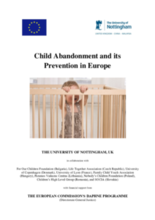Article 7 of the UN Convention of the Rights of the Child (CRC) states that every child has “the right to know and be cared for by his or her parents.” When a child is abandoned, this right is violated. Infants and young children are those most at risk of being abandoned There is a distinct lack of research in understanding the extent, causes, and consequences of child abandonment. Such studies are essential in order to develop effective prevention programs and strategies aimed at protecting children most vulnerable in the European society.
This comprehensive manual provides an overview of child abandonment and its prevention in Europe, exploring the extent of child abandonment, possible reasons behind this phenomenon, the consequences of abandonment, and good practices in terms of prevention. For the purposes of the EU Daphne-funded project, child abandonment is defined in two ways, namely open and secret abandonment. Open abandonment is defined as a child being knowingly left behind by his parent, who can be identified and whose intention is not to return but relinquish parental responsibility. Secret abandonment is defined as a child being secretly left behind his parent, who cannot be identified and whose intention is not to return but relinquish parental responsibility anonymously.
Country specific in-depth reviews of child abandonment and its prevention are provided for 10 countries (Bulgaria, Czech Republic, Denmark, France, Hungary, Lithuania, Poland, Romania, Slovakia, and the UK). As part of the project, governments from all 27 EU member countries were written to, requesting information in relation to open and secret abandonment. Of the 22 countries that responded, Slovakia (4.9 per 1,000 births) had the highest number of children openly abandoned, followed by the Czech Republic (4.1), Lithuania (3.9), and Poland (3.7).
Research shows that child abandonment is one of the key reasons why children under the age of three are placed in institutional care. It is difficult to establish the true extent of open and secret child abandonment across Europe as only some countries maintain national statistics regarding these phenomena.
The primary causes of child abandonment have been found to be poverty or financial hardship, being a single parent, post-natal depression, mental illness, a lack of sexual health education, poor family planning knowledge, restricted access to abortion, the child having disability or an illness like HIV, pregnancy as a result of rape, abuse by partner, and a lack of services and resources to support parents with disabled children. There are number of actions being taken by member countries to help prevent child abandonment including providing social assistance, day care facilities, mother-baby units, family planning services, financial support, and more.
©Elsevier: Early Human Development

